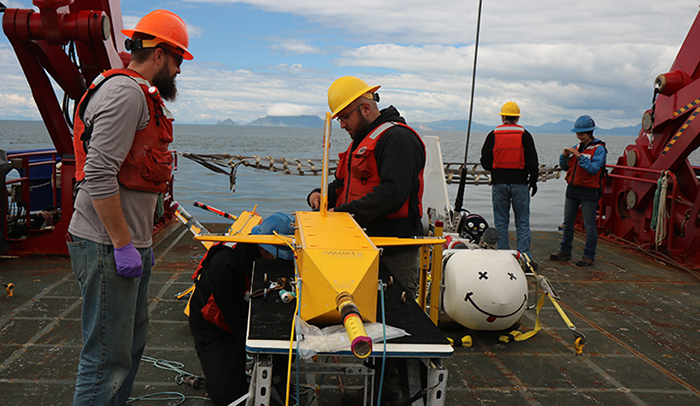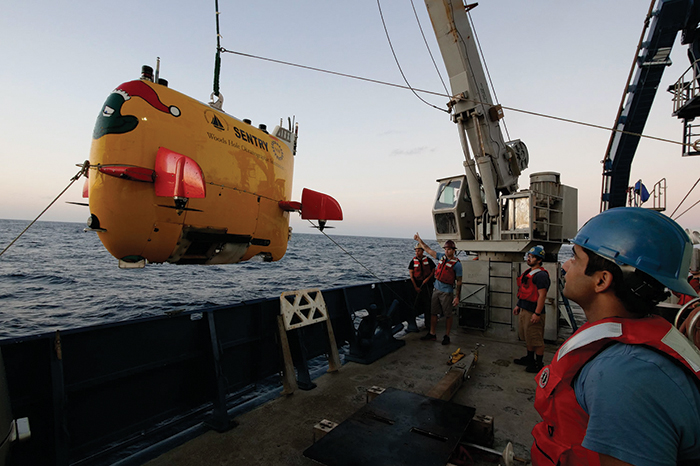Research in Geophysics
For an overview of the latest geophysics research at Scripps, please see the Institute of Geophysics and Planetary Physics annual report. For a broader view of Earth Sciences research at Scripps, see the Earth Section annual report.
Faculty and Researchers in GP Curricular Group
- Yehuda Bock
- Adrian Borsa
- Catherine Constable
- Steven Constable
- Wenyuan Fan
- Yuri Fialko
- Helen Amanda Fricker
- Alice Gabriel
- Jeffrey Gee
- Peter Gerstoft
- Jamin Greenbaum
- Jennifer Haase
- Gabi Laske
- Dave May
- Matti Morzfeld
- Ross Parnell-Turner
- David Sandwell
- Peter Shearer
- Dave Stegman
- Vashan Wright
- Adam Young
Information for the Geophysics PhD and Master’s degree programs
Students in the Geophysics (GP) graduate program study Earth and other planets to advance our fundamental understanding of their origin, composition, and evolution, and explore the implications for life, for the environment, and for society.
The graduate program provides a broad education in the fundamentals of geophysics, alongside research and coursework spanning multiple specializations. Our flexible curriculum and multidisciplinary researchers enable us to welcome graduate students from a diverse range of backgrounds in science and engineering, producing graduates who are well prepared for future careers in academia, industry, or public service.
Our multidisciplinary program offers graduate students a unique hands-on, collaborative learning environment. A core academic curriculum provides the foundation for working on research projects that emphasize observational techniques and the collection of novel datasets linked to testing new theoretical and computational approaches. GP students participate extensively in field experiments, instrument development, laboratory investigations, and shipboard expeditions. Many students take advantage of the opportunity to serve as a teaching assistant at some point during the course of their degrees.
Is our Geophysics graduate program for you?
At Scripps you can enroll for either a PhD or Masters (MS) degree. Many PhD students complete an MS en route to the PhD by completing sufficient units of coursework.
If you missed our annual Pre-Application Virtual Open House on November 16th, you can access the information that was presented that may help you decide what areas of research interest you and answer questions about the application process. Please register here and access the presentations here.
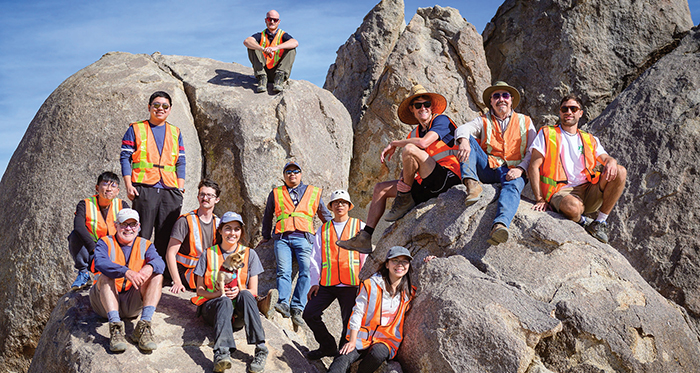
Potential Advisors and Projects for Fall 2024 Admission
The following faculty and research scientists are interested in seeking new students for Fall 2024 intake. If you wish to find out more about their research, please email them individually. If you are not sure what specific area of research you wish to pursue, or have any questions, please email the admissions coordinators, Jennifer Haase at gp-admission@ucsd.edu for help and guidance.
Yehuda Bock ybock@ucsd.edu
Geodesy, Natural Hazards. Our SOPAC group is application oriented with several research projects that can support students. These include (1) tsunami early warning systems with U.S. and Chilean agencies, (2) machine learning models for detecting transient crustal and atmospheric processes using 30-year GPS displacement and atmospheric delay time series, (3) Integration of radar interferometry and GPS for surface mapping of plate boundary deformation and subsidence due to groundwater extraction (4) Development of a dynamic reference frame for the U.S. National Spatial Reference System maintained by the National Geodetic Survey (NGS). Projects (3) and (4) are supported by NASA, California Department of Transportation (Caltrans) and California Department of Water Resources (DWR), and are in collaboration with Prof. David Sandwell’s research group.
Cathy Constable cconstable@ucsd.edu
Geomagnetism and Paleomagnetism. Projects could include 1) making time varying paleomagnetic field models on time scales from millennia to millions of years; 2) Building stochastic models for geomagnetic paleosecular variation; 3) Using paleomagnetic observables to improve realism in products of numerical geodynamo simulations.
Website: igppweb.ucsd.edu/~cathy
Steven Constable sconstable@ucsd.edu
Marine electromagnetic methods. Projects include the study of offshore groundwater, marine gas hydrate, tectonic plate boundaries, and pretty well any other geological feature found offshore. We collect and interpret our own field data, but the lab is also interested in developing algorithms and software needed for data processing and modeling/inversion of EM data.
Website: marineemlab.ucsd.edu
Wenyuan Fan wenyuanfan@ucsd.edu
Observational seismology. We focus on seismic sources and use onshore and offshore, dense array seismic observations to investigate earthquakes, slow earthquakes, subduction zone processes, environmental processes, and their interaction and triggering.
Website: igppweb.ucsd.edu/~wenyuanfan
Yuri Fialko yfialko@ucsd.edu
Space geodesy (InSAR/GNSS), earthquake and volcano deformation, active tectonics, numerical modeling, theoretical and experimental rock mechanics. Potential projects include studies of time-dependent deformation in California, Tibet, and Turkey.
Website: igppweb.ucsd.edu/~fialko
Alice Gabriel algabriel@ucsd.edu
Computational and theoretical seismology. Projects are available which use high-performance computing and physics-based modeling constrained by a multitude of observations. Application areas range from the seismic cycle in subduction zones and tsunami genesis, to strong ground motion scenarios in complicated settings, to induced seismicity. Projects may involve utilising new methods in terms of numerical discretisation, uncertainty quantification, imaging and monitoring.
Website: scripps.ucsd.edu/profiles/algabriel
Gabi Laske glaske@ucsd.edu
Observational seismology. Research projects typically cover aspects of structural seismology. Primary targets are the measurement and tomographic modeling of surface wave dispersion in combination with other seismic observables. Our research projects often involve the collection and analysis of ocean bottom seismic data in the Pacific ocean. A new project is the OHANA project that focuses on the seismic imaging of 4-50 Myr old Pacific lithosphere halfway between Hawaii and California.
Website: igppweb.ucsd.edu/~gabi
Ross Parnell-Turner rparnellturner@ucsd.edu
Marine geophysics. Projects include 1) studying how the Iceland mantle plume controls seafloor uplift and oceanic circulation using reflection seismic and deep sea drilling data; 2) investigating volcanic eruption cycles on fast-spreading mid-ocean ridges; and 3) exploring how oceanic plate spreading is accommodated by slip on low-angle detachment faults. We collect data at sea and develop numerical models; methods include passive microearthquake monitoring, reflection seismology, and seafloor mapping using autonomous robots.
Website: rosspt.weebly.com
David Sandwell dsandwell@ucsd.edu
Geodynamics, space geodesy, global seafloor mapping. We are improving the accuracy and spatial resolution of the marine gravity field using data from satellite radar altimeters inclusing the new SWOT altimeter. The improved marine gravity is important for exploring unknown tectonics in the deep oceans as well as revealing thousands of uncharted seamounts. In addition, we are developing methods to combine the high accuracy of point GPS time series with the high spatial resolution from radar interferometry to measure interseismic velocity along the San Andreas Fault system associated with earthquake hazard. Several faculty at IGPP were recently funded by the National Geodetic Survey to train graduate students in the broad field of Geodesy. These fellowships are open to both U.S. citizens and permanent resident aliens.
Website: https://topex.ucsd.edu
Peter Shearer pshearer@ucsd.edu
Seismology. Peter Shearer may have funding to support a student to study earthquakes and/or Earth structure.
Website: https://igppweb.ucsd.edu/~shearer/mahi/
Adam Young adyoung@ucsd.edu
Coastal hazards, processes, and geomorphology. We use field based and remote sensing instrumentation to quantify coastal processes and change, and evaluate how coastal change impacts society. Example research topics include coastal erosion, coastal cliffs, beach morphology, coastal sediment, sediment budgets, and anthropogenic influences on the coastal system.
Website: https://adyoung.scrippsprofiles.ucsd.edu
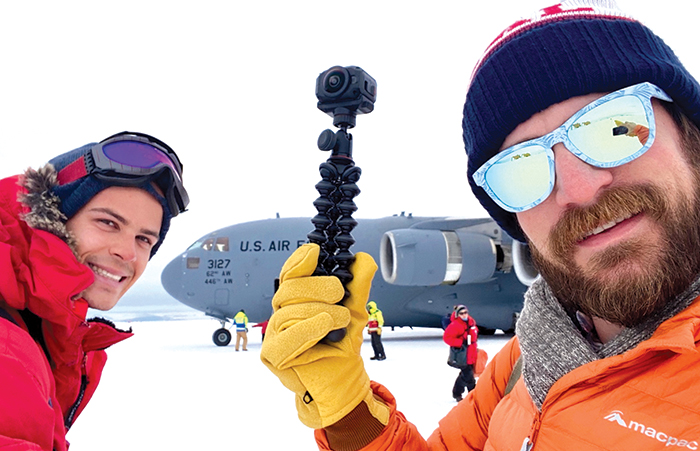
Requirements for Admission
In addition to the general requirements for admission to the PhD program, a major in physics, mathematics, or earth sciences is recommended. GRE scores are not required for Fall 2024 admission.
There are various application fee waiver programs offered by the UC San Diego Graduate Division. Please inquire with gp-admission@ucsd.edu.
GP Applicant evaluation Criteria
Factors which we use to evaluate applicants include, but are not limited to, (1) Academic Preparation; (2) Scholarly potential; (3) Diversity, equity, and inclusion contributions; (4) Alignment with the program; (5) Realistic self-appraisal; and (6) Long-term goals.
Applicants should ensure that they represent themselves accurately with the best possible information in all of the above areas. The admissions committee will consider all aspects of the application including the statement of purpose, transcripts, balance of coursework, letters of recommendation, and responses to optional questions about additional experiences. GRE scores may be included if you wish, and may serve as part of our holistic review, but they are not required. Please inquire with gp-admission@ucsd.edu.
For full consideration, please submit applications by December 6, 2023. Applications submitted after the deadline may be considered on a case-by-case basis.
Financial Support
All PhD applicants are considered for financial support. Student support during the first year may come from a variety of sources including external or departmental fellowships and research grants. More information about funding can be found here.
Additional Information
Program of Study for PhD
Students are admitted to the GP curricular group within the Geosciences of the Earth, Oceans, and Planets (GEO) Program based on their interests and the affiliations of their adviser. Each student is assigned a first year advisory committee, comprising their primary advisor and the three person GP departmental committee. Although students may change curricular groups in the course of the year, they must choose which departmental exam they will take. Departmental exams have similar structures among the curricular groups within GEO (a written exam at the end of spring quarter of their first year and an oral exam before the beginning of fall quarter of their second year).
Students are encouraged to begin a research project from the beginning and typically do not hold teaching assistant positions during their first year. Students may change advisers during their first year, but it is important for them to find an adviser by the end of the first year so that they are ready to work on research over the summer and develop a thesis proposal during their second and third years. Students are normally expected to present this proposal at their qualifying exam by the end of their third year.
No single course of study is appropriate to every student in the geophysics curricular group: instead, there is a sequence of foundational classes that each student is expected to complete successfully during the first year, together with a three-quarter seminar sequence on Geophysical Research Skills. Additional graduate class electives or research units (SIO299) under the guidance of a specific instructor provide a minimum of 12 units/quarter required for full-time study. Electives should be chosen from the broad range of available topics in consultation with the first-year guidance committee and the student’s advisor to provide breadth of expertise and to support the individual interests of the student. Some students will find it useful to take courses offered by other curricular groups across Scripps or by other departments on UCSD General campus.
The content of the foundational courses combined with the research skills acquired during the first year seminar forms the basis for the written departmental examination. A list of graduate classes offered by the GP faculty is provided below.
Students are also encouraged to attend Geophysics and Earth Section seminars for exposure to a broad range of geophysical research topics.
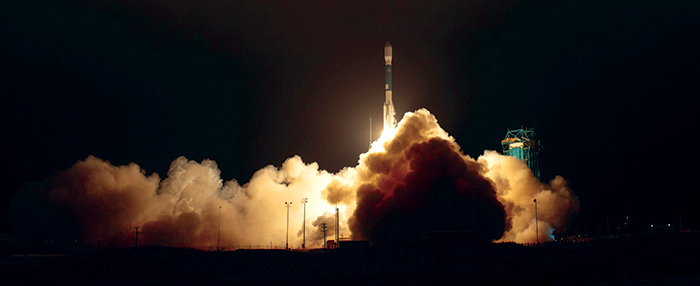
Program of Study for MS
The geophysics master’s degree provides a solid grounding in the fundamentals of geophysics for students intending to pursue professional positions in government, industry, or nonprofit organizations or to apply to PhD programs. Two different degree options are available:
MS Plan I—Thesis
This plan combines course work and research, culminating in the preparation of a thesis. A minimum of thirty-six units of credit is required: twenty-two units are expected from Foundational Courses (see below); and twelve units of research work (SIO299) lead to the thesis. Students should contact a thesis adviser and co-adviser prior to, or as part of, the application process. Students are rarely accepted into the program without this prior consultation. This two-member faculty committee, in consultation with the student and the Geophysics Curriculum Advisor, will select the courses and research topic to be completed in two years or less.
MS Plan II—Comprehensive Exam
This course of study is intended to be completed in a single year and requires a minimum of thirty-six credit units. Twenty-two units are expected from the Foundational Group and the remaining twelve units will be selected in consultation with the student’s faculty mentor and geophysics departmental committee. Students must pass a written comprehensive examination at the end of the spring quarter of the first year, which will cover material in the foundational course work.
Foundational classes:
- SIOG 200 A/B/C Geophysics Research Skills: Geophysics 1st year seminar (2 units/ quarter)
- SIOG 223A Geophysical Data Analysis I (4 units)
- SIOG 223B. Geophysical Data Analysis II (4 units)
- SIOG 225. Physics of Earth Materials (4 units)
- SIOG 234. Geodynamics (4 units)
Electives:
- SIOG 221. Plate Tectonics in Practice (4 units)
- SIOG 222. Introduction to Industry Reflection Seismic Methods (4 units)
- SIOG 224. Internal Constitution of the Earth (4 units)
- SIOG 227A. Introduction to Seismology (4 units)
- SIOG 227B. Structural Seismology (4 units)
- SIOG 227C. Seismological Sources (4 units)
- SIOG 228. MS Research Seminar for students in contiguous BS/MS programs
- SIOG 229. Fundamentals of Gravity and Geodesy (4 units)
- SIOG 230. Introduction to Inverse Theory (4 units)
- SIOG 231. Geomagnetism and Electromagnetism (4 units)
- SIOG 232. Ethical and Professional Science (2 units)
- SIOG 233. Introduction to Computing (4 units)
- SIOG 236. Satellite Remote Sensing (4 units)
- SIOG 238. Numerical Methods for PDEs (4 units)
- SIOG 239. Special Topics in Geophysics (4 units)
- SIOG 240. Marine Geology (4 units)
- SIOG 247. Rock Magnetism and Paleomagnetism (4 units)
Potential Upper Division UG Electives (if appropriate):
- SIO 105. Sedimentology and Stratigraphy (4 units)
- SIO 110. Introduction to GIS and GPS for Scientists (4 units)
- SIO 113. Introduction to Computational Earth Science (4 units)
- SIO 160. Introduction to Tectonics (4 units)
- SIO 161. Seismology (4 units)
- SIO 162. Structural Geology (4 units)
- SIO 182A. Environmental and Exploration Geophysics (4 units)

